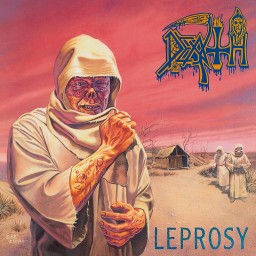 Review by Ben for Death - Leprosy (1988)
Review by Ben for Death - Leprosy (1988)
Leprosy hugely evolved the genre and remains an entertaining slab of old school death metal.
As would become the norm for Death, this is a whole new line-up to the preceding album. Chris Reifert, who played drums on Scream Bloody Gore, stayed in San Francisco when Chuck moved back to Florida in 1987, therefore ending his involvement with the band. The original line-up of Death, way back in 1984, had contained Chuck, Rick Rozz on guitar and Kam Lee on drums, yet after Rick and Kam left the band they’d joined up with Allen West and Bill Andrews in Massacre. That band would also have numerous line-up troubles and disbanded several times. In 1987, during one of those breaks from Massacre, three members of Massacre (Rick, Bill and bassist Terry Butler) joined forces with Chuck to make an all new Death line-up. The four of them were responsible for numerous live performances in this period and are credited as the line-up for Leprosy, yet typically for Death (Scream Bloody Gore had a band photo containing guitarist John Hand even though he never played with the band), things aren’t that simple. Despite the album liner notes suggesting Terry performed bass on Leprosy, Chuck has since stated that he himself performed all bass on the album, meaning the official album line-up is Chuck (guitar, bass, vocals), Rick (guitar) and Bill (drums).
Those listening to Leprosy today often complain about the snare sound and there’s certainly no denying that it distracts from the end result. But in 1988, this was the most extreme and exciting recording imaginable and it was exactly how fans thought death metal should be. Leprosy was the first full length death metal album recorded in Morrisound Studios in Tampa, Florida. The resulting sound was so incredibly influential that multitudes of bands tried to replicate it over the next few years. In fact, within two years of Leprosy being released, Atheist, Morbid Angel, Terrorizer, Obituary, Deicide and Nocturnus had all recorded their classic debut albums at the studio. The infamous Scott Burns was involved in many of these albums in some form, but it’s worth pointing out that he held an engineering position only for Leprosy, with Dan Johnson producing. Morrisound would become synonymous with death metal and just about every classic American death metal album would be recorded there over the next decade, including all remaining Death releases and monstrous classics like Morbid Angel’s Blessed Are the Sick, Obituary’s Cause of Death, Atheist’s Unquestionable Presence, Cynic’s Focus and Suffocation’s Pierced From Within. But let's have a good look at the original!
They say you shouldn’t judge a book by its cover, but Scream Bloody Gore had been everything it said it was going to be on the box. Blood drenched old school death metal with gory lyrics and a nasty, malevolent atmosphere. Yet a few tracks, such as Zombie Ritual and Baptized in Blood, hinted that later Death outings might have something more to offer fans with some neat melodies and reasonably complex song structures. Leprosy certainly delivered on that promise and while there’s no doubt that Death had not yet reached the technical mastery or breathtaking song writing displayed on albums like Human, Individual Thought Patterns and Symbolic, they singlehandedly pushed the evolution of death metal into overdrive with this release. German magazine Rock Hard once voted Leprosy the number one most important death metal album of all time, and while I’m not going to throw impressive statements like that one around, it would have to be up there on any list of its type. The title track, Left to Die, Pull the Plug and Open Casket are classic Death tracks that still offer up huge entertainment decades later. It’s the type of album you put on when you just want to bang your head to a consistent flow of solid death metal from the guy who arguably designed it.
The lyrical content also began a transition between the horror themed gore of the debut album and the more intelligent and thought provoking material of later works. The difference between songs about horrifically torturous ways to die based in fantasy and horrifically torturous ways to die based in reality may not seem particularly dramatic, but there’s no doubt a shift in lyrical maturity between tracks such as Regurgitated Guts or Evil Dead and Leprosy or Pull the Plug. It’s hard to mention Pull the Plug without discussing the sad irony that its theme would end up holding for Chuck. One has to wonder whether he thought back on the lyrics while he struggled to survive brain stem cancer and pneumonia at the age of 34. “Pull the plug, Let me pass away, Pull the plug, Don't want to live this way”. I won’t be disrespectful and suggest he might have regretted underestimating the importance of life with these words as I’m in no position to judge the man, but it certainly gives the track more of an emotional edge for those of us that knew him only through his music. His death is in no way the only reason we worship the music of Charles Michael Schuldiner, but it certainly makes us realise how precious it is that it ever existed in the first place.
